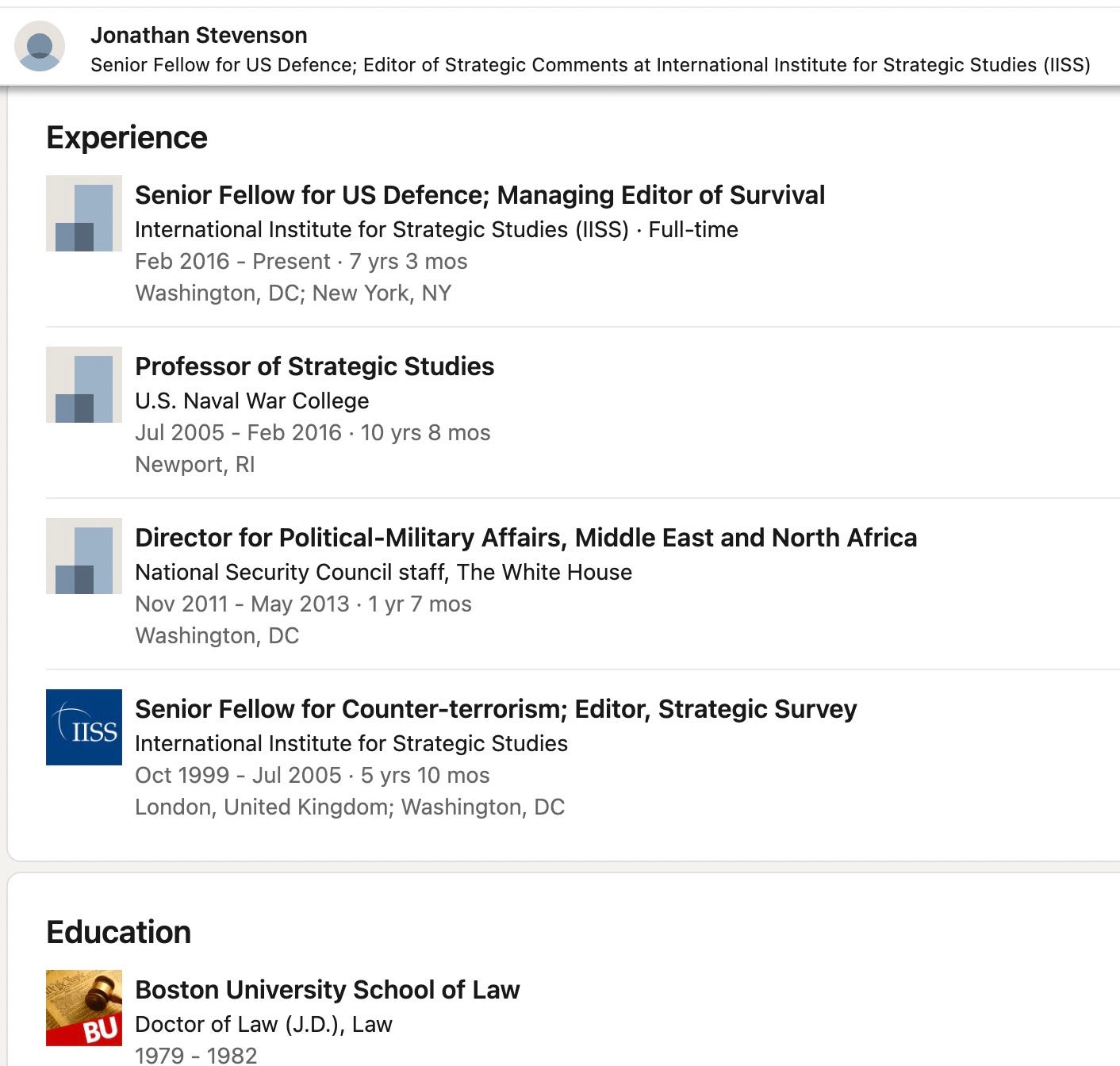Politico in Wonderland
the respectable members of the analytical class have gone completely insane
Politico has just published a hair-on-fire warning that we may yet see bands of Trumpers go full-insurgent, breaking into terrorist cells and launching raids with their “high-powered” AR-15s. Every paragraph is provably wrong; every sentence is dull-minded and bizarre, somehow simultaneously colorless in prose style and febrile in substance to the point of madness. The authors are respectably placed think tankers with extremely predictable professional histories; if you swing a cat at a midwit conference, you’ll hit a few of this precise type.
They are insane, full stop, and the social psychosis of their status group is becoming dangerous. I write all the time about professors and think tankers who are, individually, not that important, and I always get some version of the “why would you bother with this person?” comment. They matter as a whole; there are armies of them, and they drive policy at every level of government and corporate power.
So. Here’s where these folks think we may be headed in America, though they offer the chin-stroking concession that “we are not there” yet:
Radicalized Republicans ultimately may be too feckless and atomized to mount a revolution, with Trump incapable of transforming them into a truly revolutionary force. Perhaps a free-rider effect is at work, where many would revolt but only if all went at once. While desperate East Germans surmounted such a hurdle in 1953, relatively comfortable Americans are less likely to do so. But large-scale civil collapse need not involve the concerted efforts of a critical mass of people. For every Northern Ireland, there is a Somalia. Purposeful militias aren’t required, only spiraling acts of violence by small numbers of people that may originate spontaneously but, fueled by retaliation, develop their own momentum.
The fallout could be disastrous. Gradually escalating attacks triggered by key events and facilitated by the growing accumulation of privatized high-powered weapons like AR-15s, largely on the right, could increase polarization to a point of irreversibility. A contagion of localized but widespread tit-for-tat violence could produce mass abdications on the part of local law enforcement and overwhelm the capacity of the federal authorities, turning expanding pockets of U.S. territory into essentially Darwinian enclaves. Such a scenario — recall “Bleeding Kansas” in the 1850s — is broadly in line with the run-up to the Civil War.
Fortunately, there are also some sources of stability in the country, like “President Joe Biden’s largely effective tenure in the White House.” The calm, steady hand of the cooly competent word-slurring toddler sniffer is the American technocratic glue, and all voices sing his praises as one. This is probably also true in Afghanistan, where his largely effective tenure is so deeply admired.
Weirdly, a considerable majority of Americans don’t want a largely effective president to run for re-election, even though we’re safe in his firm paternal grip. It must be because America is tired of competence.
In that block quote, note the function of language in slipping unproven assumptions into a fake narrative without evidence or testing: “….with Trump incapable of transforming them into a truly revolutionary force,” which leads you calmly into the presumption that Donald Trump’s intent is to lead an armed revolution from his rebel base at Mar-a-Lago. He’s using golf as a cover to train his commanders at field maneuvers, obvo.
Look through the Politico “analysis” to find the place where the authors address the decline of trust in American institutions, and know in advance that this challenge is like the one where a gaggle of NCOs send the new private to the supply room to get them a gallon of blinker fluid. The rock the piece stands on is the completely comfortable assumption that all decent people trust government with absolute devotion and at all times, and that government invariably merits that trust. And so criticism of the Manhattan DA’s indictment of Donald Trump can only be a maneuver, a game played for political power:
The hyperbolic reactions of far-right Republican political figures and media commentators to the Trump indictment signal that they certainly do not believe the MAGA fever among their constituents and consumers has broken.
Prosecutors work for the government, dummy. That means prosecutors are always good, and must never be criticized or subjected to skepticism. Expressions of concern over the first indictment of a former president in two and half centuries of the nation’s existence — a departure from what was a universal norm — are necessarily hyperbolic. There’s no possibility of a legitimate ground for doubt, and anyone who doesn’t praise Alvin Bragg is just engaged in sick MAGA performance. Meanwhile, ask any garden variety liberal legal analyst or journalist about the strength of the indictment, and they start mumbling and avoiding eye contact: “The problem is that an extremely unusual set of circumstances gave rise to this alleged crime, denying Bragg the ability to fortify his charges with precedent and thereby leaving Trump ample room to question their legitimacy.” Sounds rock solid to me. It must be domestic terrorism to doubt the strength of the case.
Over and over again, the authors of this Politico essay use words to hide meaning rather than to convey it:
Senior U.S. counterterrorism officials assess that the risk of major civil disruption is still salient. While most domestic political violence is perpetrated by lone actors, and federal law enforcement’s post-Jan. 6 crackdown has undeniably had a deterrent effect on fence-sitters while incarcerating many who followed through on their beliefs, political polarization has not materially diminished. And it is precisely political polarization that has hindered the federal government’s ability to counter domestic extremism. The term “domestic terrorism,” however appropriate it may be, is politically toxic to most congressional Republicans.
When counterterrorism officials assess that something “is salient” or isn’t, are they ever wrong? What’s the connection between January 6 arrests and the diminishment of political polarization — people were supposed to start agreeing with Democrats on policy because the FBI arrested people? Might the term “domestic terrorism” be “politically toxic” to Republicans because of the increasingly casual use of those extraordinarily loaded words to refer to ordinary political disagreement? What happens to these sentences if you spend a moment thinking about them?
Over at Politico, the big finish is that a Republican defeat in 2024 could lead to s scenario in which Trump “rallies dispersed local groups prone to violent local resistance.” I mean, we’ve already set out our claymores over here in South Pasadena. Wolverines!
This is masturbation, and it’s somehow considered highly respectable analysis from important public intellectuals. Children also scare themselves with fake monsters, but we don’t start think tanks for them.



It was interesting watching globohomo pivot from the "War on [Islamic] Terrorism" (20 years of hyping up fear of Islamic attacks, then having the FBI and CIA behind pretty much every Islamic terror attack on western soil) to the "war on white people", which is just ramping up now and will probably last just as long or longer. Once they got off the Muslims=terrorists train, the number of Islamic terror attacks dropped sharply...
I have this vague growing apprehension that we are being subtly guided towards outright civil war. Clearly, this country is being intentionally divided into “Us vs Them” and discord is being fomented on a daily basis. My sense is that the elite Lefties want the Right to revolt so that they can use the force of the mighty US Government to squash the rebellion and silence all dissent once and for all. These “think tank” doofuses are unwitting (or willing) accomplices and are laying out the blueprint for what’s being planned. I find it terribly disturbing. Am I being paranoid? I certainly hope so!